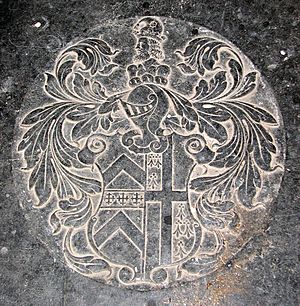Horatio Walpole (died 1717) facts for kids
Horatio Walpole (born July 11, 1663 – died 1717) was an English politician from Beck Hall, Norfolk. He was a member of the Tory Party, which was one of the main political groups in England at the time. Horatio served in the English House of Commons and later the British House of Commons between 1702 and 1710. He was the uncle of Sir Robert Walpole, who later became a very important leader, much like a Prime Minister. However, Horatio often had different political ideas from the rest of his family.
Contents
Horatio Walpole's Early Life
Horatio Walpole was the fourth son of Sir Edward Walpole and his wife, Susan Crane. His family lived in Houghton, Norfolk. He was the younger brother of Colonel Robert Walpole. This made him the uncle of Sir Robert Walpole, who was a leader of the Whig Party, the main rival to the Tories.
Horatio joined the army when he was younger. In 1685, he was a cornet (a junior officer) in a cavalry unit. He later became a captain in the 2nd Dragoon Guards from 1689 to 1691.
In 1691, Horatio left the army to get married. He married Lady Anne Coke on March 26, 1691. Lady Anne was the widow of Robert Coke and the daughter of Thomas Osborne, 1st Duke of Leeds.
His Time in Politics
Horatio's wife's family were strong supporters of the Tory Party. Horatio wanted to fit in with them, so he looked for a way to become a Member of Parliament (MP). This was a way to have a say in the country's laws.
His brother Robert had a lot of influence in the area of Castle Rising. However, Robert chose to represent himself and another person, Thomas Howard, in Parliament in 1695 and 1698.
When his brother Robert passed away, Horatio became a trustee for his nephew, also named Robert. This meant Horatio helped manage his nephew's affairs. When his nephew needed money, Horatio could use his position to influence things.
Becoming a Member of Parliament
In 1701, Horatio was offered a chance to become an MP for Dunwich, but he said no. At the 1702 English general election, his nephew ran for King's Lynn. This gave Horatio the chance to run for Castle Rising.
Some people in the area were worried about Horatio becoming an MP. They thought he was too strong a Tory. Local Dissenters (people who did not follow the main Church of England) needed to be promised that Horatio would not cause trouble for them. Despite these concerns, he was elected.
Walpole's Political Actions
Once he became an MP, Horatio Walpole did not seem to be very active in Parliament. He became a Freeman of King's Lynn in 1703.
He was re-elected for Castle Rising in the 1705 English general election. Many Whigs in Norfolk were disappointed because they felt he wasn't doing much. He voted against the King's choice for Speaker of the House, but he still didn't contribute much to debates.
Horatio was elected again in the 1708 British general election. In 1710, he voted against the impeachment (a formal accusation of wrongdoing) of Dr. Sacheverell.
Horatio's lack of activity was becoming a problem for his nephew. In the 1710 British general election, his nephew ran for Castle Rising instead of him. However, his nephew later helped Horatio get elected in a special election on December 11, 1710.
Around this time, Horatio started to have money problems. His wife spent a lot, and he had to pay rent for Beck Hall. He wrote letters to Robert Harley, a powerful politician, asking for help. He claimed he was a good Tory agent in Norfolk and wanted a better job.
In 1712, he was given a job as a commissioner of revenue for Ireland. This meant he helped collect taxes there. In 1713, he voted for a bill about trade with France. In August 1713, he presented a message to the Queen from Norfolk, congratulating her on a peace treaty.
Horatio was not chosen to be an MP in the 1713 British general election. However, he kept his job as a commissioner until 1716.
Later Life and What He Left Behind
Because the rent for Beck Hall was too high, Horatio bought a new estate in Broomthorpe in 1715. He paid £2,200 for it and also received £60 a year for the rest of his life.
Horatio Walpole passed away at Broomthorpe on November 17, 1717. He did not have any children.
He left his Broomthorpe estate to his nephew Galfridus Walpole. He also left money to other family members from his brother Colonel Robert's side. This included £1,000 for Robert Walpole and £100 for Horatio Walpole. This younger Horatio later became the MP for Castle Rising, just like his uncle.
 | Frances Mary Albrier |
 | Whitney Young |
 | Muhammad Ali |


